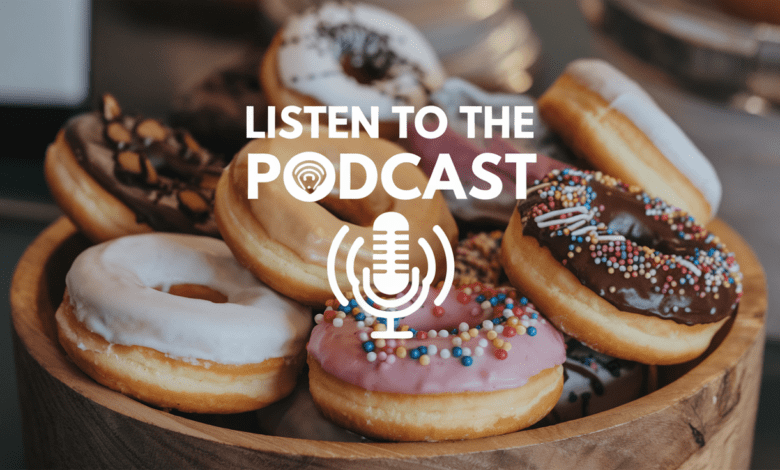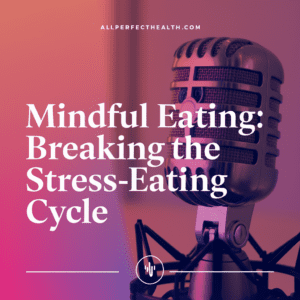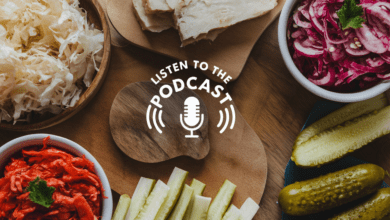Mindful Eating: Breaking the Stress-Eating Cycle

Stress eating is a common problem that affects many people. When we’re stressed, we often reach for unhealthy foods high in fat and sugar. This can lead to weight gain and health problems if we don’t stop. Mindful eating is a great way to break this cycle and have a healthier relationship with food and our bodies.

December 24, 2024 ·
10 Min, 32 Sec · By All Perfect Health
#006: In this episode of Mindful Eating: Breaking the Stress-Eating Cycle, we tackle the emotional triggers behind stress eating and provide actionable steps to break the cycle for good. Discover how mindfulness can transform your relationship with food, reduce stress, and help you make healthier choices. Learn practical tips to identify stress-eating patterns, strategies to build emotional resilience, and mindful eating techniques to regain control over your habits. Whether you're looking to overcome emotional eating or simply build a healthier relationship with food, this episode offers valuable insights and tools to empower your journey. Visit allperfecthealth.com for more resources and tips!
| Key Takeaways |
| – Mindful eating means paying full attention to eating
– Stress can mess up normal hunger signals and cause unhealthy eating – Mindful eating can reduce emotional eating and improve health – Combining mindful eating with stress management works best – Small changes in eating habits can lead to big improvements over time |
What is Mindful Eating?
Mindful eating means paying close attention to your food and the whole eating experience. It’s not just about what you eat, but how and why you eat too. This practice involves:
- Eating slowly and chewing well
- Noticing the colors, smells, flavors, and textures of your food
- Listening to your body’s hunger and fullness signals
- Eating without distractions like TV or phones
- Thinking about where your food came from
- Recognizing emotional triggers for eating
- Being thankful for your food
By eating mindfully, you become more aware of why, when, and how much you eat. This can help you make better food choices, avoid overeating when stressed, and feel better about food and your body. Mindful eating helps you enjoy each bite more, which can make you feel satisfied with less food and want to choose healthier options.
Why We Stress Eat
When we’re stressed, our bodies release hormones like cortisol. These hormones can make us really hungry and crave sugary, fatty foods. This made sense for our ancestors who needed extra energy to run from dangers, but now it just leads to eating too much.
Over time, being stressed a lot can mess up our normal hunger signals. This can make us think we’re hungry when we’re really just feeling emotions. About 40% of people eat more when stressed, while 40% eat less and 20% don’t change. Girls and women are more likely to use food to deal with stress than boys and men.
Good Things About Mindful Eating

Mindful eating can help both your body and mind. Some good things about it include:
- Less stress eating
- Better digestion
- Enjoying food more
- Staying at a healthy weight
- Feeling better about food
- Being more aware of your body
- Keeping blood sugar steady
- Feeling less anxious or sad about food and your body
Studies show that mindful eating can help people stop binge eating and emotional eating. It can also help people manage their weight over time when combined with learning about nutrition. Plus, it can help reduce feelings of anxiety and depression related to food and body image.
How to Eat Mindfully
You don’t need to make big changes to start eating mindfully. Here are some tips to get started:
- Eat slowly and pause between bites
- Put your fork down while chewing
- Take small bites and chew well
- Notice the taste, texture, and smell of your food
- Eat in a calm place without distractions
- Check how hungry you are throughout the meal
- Stop eating when you feel satisfied, not stuffed
- Say thank you for your meal before eating
- Try eating with your other hand to slow down
- Try eating in silence for part of your meal
It takes time to change eating habits, especially ones caused by stress and emotions. Be patient with yourself as you learn. Start with one meal a day and slowly do more. Remember, mindful eating is a skill that gets better with practice.
Other Ways to Handle Stress
While mindful eating can help with stress eating, it’s also important to deal with the causes of stress. Try these other ways to reduce stress:
- Exercise regularly
- Meditate or do deep breathing
- Get enough sleep (7-9 hours a night)
- Talk to a friend or therapist
- Manage your time better
- Do yoga
- Enjoy hobbies or creative activities
- Spend time in nature
Learning meditation techniques can be really helpful for managing stress and practicing mindfulness. Regular meditation can make it easier to stay present and mindful during meals.
Creating Healthy Eating Habits

Mindful eating works best when you also eat healthy foods. Here are some tips for healthy eating:
- Eat lots of fruits and vegetables
- Choose whole grains over refined grains
- Include lean proteins
- Limit processed foods and added sugars
- Drink plenty of water
- Eat healthy fats like avocados, nuts, and olive oil
- Plan meals and snacks ahead of time
- Practice portion control but still enjoy a variety of foods
Mindfulness is a simple and effective way to put healthier eating on your holiday menu. Mindful eating isn’t about restrictions; it’s about eating slowly, savoring each bite and listening to your body. #RestfulNotStressful
— American Heart Association (@American_Heart) November 25, 2024
Learning about different healthy eating approaches can help you find a balanced diet that works for you. Remember, the best diet is one you can stick with long-term and that makes you feel good both physically and mentally.
Conclusion
Breaking the stress-eating cycle takes time and practice. Mindful eating can help you have a healthier relationship with food, your body, and your emotions. By paying attention to your eating habits, managing stress in healthy ways, and eating nutritious foods, you can feel better overall and handle stress better.
Remember, small changes can make a big difference over time. Start by trying one or two mindful eating practices each day and slowly add more. Be kind to yourself as you work on these new habits. Change takes time, and you don’t have to be perfect.
If you’re having trouble with stress eating or other eating issues, it’s okay to ask for help. A doctor, dietitian, or therapist who specializes in eating behaviors can give you personalized advice and support. With the right tools and help, you can develop a healthier, more mindful way of eating that’s good for both your body and mind.



